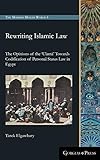Rewriting Islamic Law : The Opinions of the 'Ulamā' Towards Codification of Personal Status Law in Egypt / Tarek Elgawhary.
Material type: TextSeries: The Modern Muslim World ; 6Publisher: Piscataway, NJ : Gorgias Press, [2019]Copyright date: ©2019Description: 1 online resource (241 p.)Content type:
TextSeries: The Modern Muslim World ; 6Publisher: Piscataway, NJ : Gorgias Press, [2019]Copyright date: ©2019Description: 1 online resource (241 p.)Content type: - 9781463239084
- 9781463241193
- 346.6201/5 23
- KRM540
- KRM540
- online - DeGruyter
- Issued also in print.
| Item type | Current library | Call number | URL | Status | Notes | Barcode | |
|---|---|---|---|---|---|---|---|
 eBook
eBook
|
Biblioteca "Angelicum" Pont. Univ. S.Tommaso d'Aquino Nuvola online | online - DeGruyter (Browse shelf(Opens below)) | Online access | Not for loan (Accesso limitato) | Accesso per gli utenti autorizzati / Access for authorized users | (dgr)9781463241193 |
Browsing Biblioteca "Angelicum" Pont. Univ. S.Tommaso d'Aquino shelves, Shelving location: Nuvola online Close shelf browser (Hides shelf browser)
Frontmatter -- TABLE OF CONTENTS -- ACKNOWLEDGMENTS -- A NOTE ON TRANSLITERATION, SPELLING, AND OTHER CONVENTIONS -- INTRODUCTION. ORIGINS OF CODIFICATION, CODIFICATION OF ISLAMIC LAW, AND THE RISE OF PERSONAL STATUS LAW -- CHAPTER 1. 'ULAMĀ' OF THE CODE -- CHAPTER 2. DEFENDERS AND ADVOCATES OF CODIFICATION -- CHAPTER 3. THE COUNTER ARGUMENT: 'ULAMĀ' AGAINST CODIFICATION OF PERSONAL STATUS LAW -- CHAPTER 4. 'ULAMĀ' ON THE FENCE: A SILENT MAJORITY? -- CONCLUSION -- BIBLIOGRAPHY -- INDEX
restricted access online access with authorization star
http://purl.org/coar/access_right/c_16ec
The codification process of personal status laws in Egypt began in the mid-1800s, continuing until the abolition of the Sharī'a courts in 1955, with the absorption of personal these statutes into the newly drafted civil code and the national courts that administered them. Throughout this period, legal codification entailed finding appropriate rulings from the annals of Islamic law and structuring these rulings using the model and language of European legal codes, usually the French code. Prior to this, the area of personal status law was the exclusive domain of the 'ulamā' and the Sharī'a. In Egypt, personal status laws were exclusively based on Ḥanafī law, and issues surrounding the consolidation and codification of these laws first took place within the framework of classical Islamic law, not outside of it. To understand the significance of the process of codification, therefore, it is important to examine the attitudes of the 'ulamā' regarding it and its place within the edifice of Islamic law. Furthermore, since the 'ulamā' themselves are a diverse group, it is also important to understand the various approaches adopted to the process of codification to fully appreciate the great significance it had on the re-formatting and re-writing of Islamic law. "Sharia codification in the 19th and 20th centuries is an important chapter in the story of Islamic law and modernity. The author is an accomplished scholar, trained in both Western academia and at the al-Azhar Seminary, and has done a wonderful job of narrating and analyzing this historic process." H.E. Dr. Ali Gomaa, Former Grand Mufti of Egypt. "A fascinating and meticulously-researched study highlighting the tensions in turning shari'ah personal status laws into state law in Egypt during the twentieth century" HRH Prince Ghazi Bin Muhammad of Jordan.
Issued also in print.
Mode of access: Internet via World Wide Web.
In English.
Description based on online resource; title from PDF title page (publisher's Web site, viewed 31. Jan 2022)









